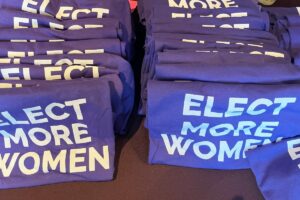S.C. Needs More Women in Public Office
Originally published by Andy Brack for the Charleston City Paper
If there’s one thing you hear more these days from women across South Carolina, it’s this: “I am sick and tired of men telling us what to do – what to do with our bodies, what to do with our brains, what to do with our lives.”
So more women are getting active. If they win more elections, South Carolina will be better off.
“We need to ask more women to step into political roles,” said Columbia nonprofit leader Barbara Rackes, whose S.C. Women in Leadership (SCWIL) organization honored seven women leaders at a Tuesday dinner.
Among those in attendance were the state’s five women state senators – three Republicans, one independent and one Democrat – who banded together to fight a six-week abortion ban in recent years. Their stance recently won them a major national recognition – the John F. Kennedy Profile in Courage Award.
“This year’s Profile in Courage Awards honor leaders who took stands of conscience and risked their careers by putting the public interest ahead of their own political standing,” said Caroline Kennedy, the ambassador to Australia who is daughter of the late President John F. Kennedy. “The women of the South Carolina Senate set an example for those seeking justice and individual freedom at all levels of government.”
This week, SCWIL also honored these “sister senators” – Republicans Katrina Shealy of Lexington, Sandy Senn of Charleston, Penny Gustafson of Camden, as well as Independent Mia McLeod of Columbia and Margie Bright Matthews of Walterboro – with the 2023 Leadership Legacy Award.
Cribbing from a saying by Eleanor Roosevelt, Matthews told the 300+ attendees how women can get things done for South Carolina: “A woman is like a tea bag. You can’t tell how strong she is until you put her in hot water.”
She and her colleagues bonded over restrictive proposals for abortion, even though they had slightly different positions on the issue.
“We got sick of being told [by men] in committee meetings that women just use abortion as a form of birth control,” Matthews said. “We got sick of being told that women just slaughter their children. So we went to our regular meeting place – in the bathroom.” And as they bonded, they realized there were other big issues – women’s health care needs, birth control and a “patriarchal oligarchy” that tries to keep women on the sidelines.
In South Carolina, women are grossly underrepresented in the Statehouse. Despite slightly more than half of the people in South Carolina being women, just 15 percent are elected to the House and Senate. That’s the second worst rate in the nation. Throughout the state in other elected and appointed positions, women are also underrepresented.
“We need to fix that – we really do,” Senn said.
Shealy, who first won election in 2012 to become the first woman senator in the chamber at the time, added, “We do agree on the basic issue that women have rights just like men do.”
Barbara Melvin, president and CEO of the S.C. State Ports Authority in Charleston, received SCWIL’s 2023 Leading Woman recognition and the group named state Rep. Heather Bauer, D-Richland, as its rising star.
Melvin said more women needed to be in leadership roles in all areas – business, government, education and more. Why? Because diversity provides different perspectives that create better outcomes.
“It helps you see things differently and come to a better decision,” she said.
For South Carolina to do better and more for all of her citizens, let’s hope more women run for office in 2024 and remove misogynistic men and their outdated values. Maybe then, we can start getting better, more considerate and collaborative decisions, big and small.
